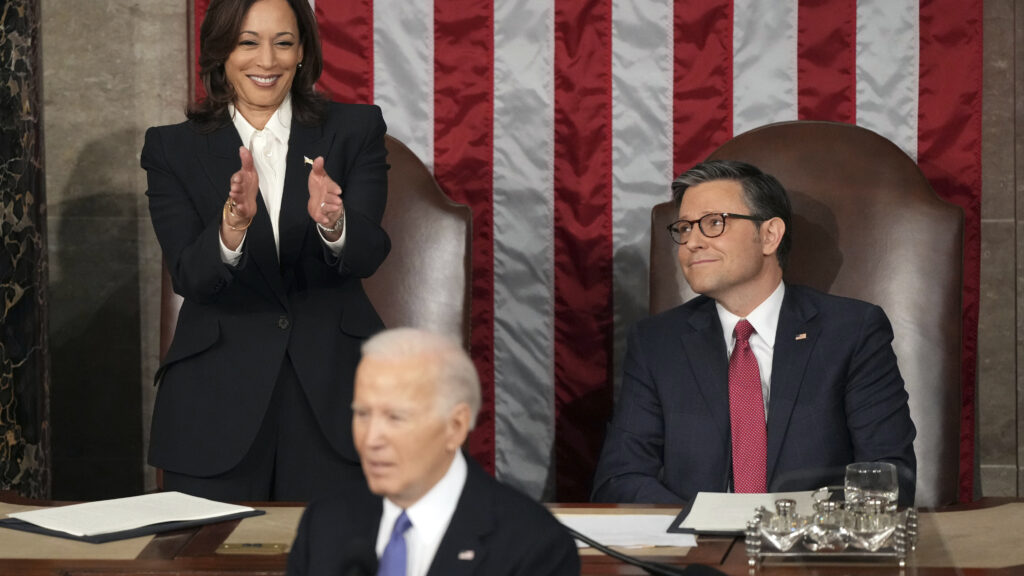WASHINGTON — President Biden started his sprawling national address Thursday night with a warning to Republicans: Women have rebuked attempted abortion limits in past elections, and they will do it again.
Yet the November elections are months after the Supreme Court is expected to decide two pivotal cases in abortion rights. The two conservative justices who have most publicly questioned federal abortion protections and access to the abortion pill mifepristone, Clarence Thomas and Samuel Alito, did not attend the State of the Union, as they rarely do.Conservative justice Amy Coney Barrett also did not make an appearance.
advertisement
“If Americans send me a Congress that supports the right to choose I promise you: I will restore Roe v. Wade as the law of the land again,” Biden said to standing ovations from Democrats and stony faces from Republicans and the six attending Supreme Court justices.
Since the Dobbs decision overturning federal abortion rights in June 2022, voters in four states have approved ballot measures to shore up reproductive rights, while three states — Montana, Kansas, and Kentucky — rejected limits. Florida, Maryland, and New York are voting on codifying rights in the upcoming election.
“Every time we go to the ballot box on the issue of abortion, on the issue of reproductive freedom, we win. Abortion rights win; reproductive freedom wins,” Rachel O’Leary Carmona, executive director of Women’s March, told STAT. “And every time it goes to court, we lose.”
advertisement
One of the cases before the Supreme Court, slated for oral arguments in just over two weeks, could limit prescriptions mifepristone access and jeopardize its federal approval. The second, due in April, centers on protections for doctors to perform emergency abortions.
Advocates are concerned that despite Biden’s strong words, there is not a clear plan for the potential fallout of either of these decisions besides the November election.
“There’s always going to be a need for a policy response to whatever comes down,” said Amy Friedrich-Karnik, director of federal policy at reproductive rights nonprofit The Guttmacher Institute.
One effort floated by advocates is shoring up access to misoprostol, another approved abortion pill that is slightly less effective but often used in tandem with mifepristone. Misoprostol is approved for other uses including stomach ulcers.
Former President Trump has not taken a public stance on abortion laws since Roe’s demise, though reports swirl that he is mulling support of a national ban beyond 16 weeks of pregnancy.
Other Republicans have softened their stance amid voter blowback. Ohio Sen. J.D. Vance in December told CNN that Republicans have to accept that Americans do not want a blanket abortion ban. He previously described his state’s successful ballot measure to enshrine reproductive rights as a “gut punch” to anti-abortion advocates and suggested that exceptions to his party’s proposed bans could draw more support.
“There is a mountain of evidence that exceptions don’t work,” Carmona said. “We need a clear-eyed vision on that from President Biden.”
Democrats sought to prove that point with a host of guests in the House chamber Thursday night. The White House invited Kate Cox, one of the first Texans to be denied an emergency abortion under a broad post-Roe ban, and Latorya Beasley, an Alabama woman undergoing in vitro-fertilization when the state Supreme Court ruled an embryo a person, effectively barring the procedure.
Virginia Democratic Senator Tim Kaine brought the first person born via IVF, Elizabeth Carr, while Sen. Tina Smith of Minnesota invited Tammi Kromenaker, director of a women’s clinic that relocated from North Dakota after abortion limits.
Those guests were dotted among members of the Democratic Women’s Caucus, who wore a sea of white clothes again this year after donning the color in 2020 to represent 100 years since the 19th amendment granting women’s right to vote. This year, the caucus said the color represented women’s need to “access the health care they need to control their own lives and futures.”
Though many Republicans scrambled after the Alabama court triggered IVF pauses to express their support for the procedure, they stayed seated when the president called for “the right to IVF nationwide.”
GOP guests included Louisiana Right to Life’s Benjamin Clapper, invited by Sen. Bill Cassidy; and Ryan Bomberger, co-founder of The Radiance Foundation, invited by Virginia Rep. Bob Good.
Virginia’s state legislature last year rebuked a 15-week ban proposed by Republican Gov. Glenn Youngkin, and in November voters flipped the House, giving Democrats control of both chambers.

